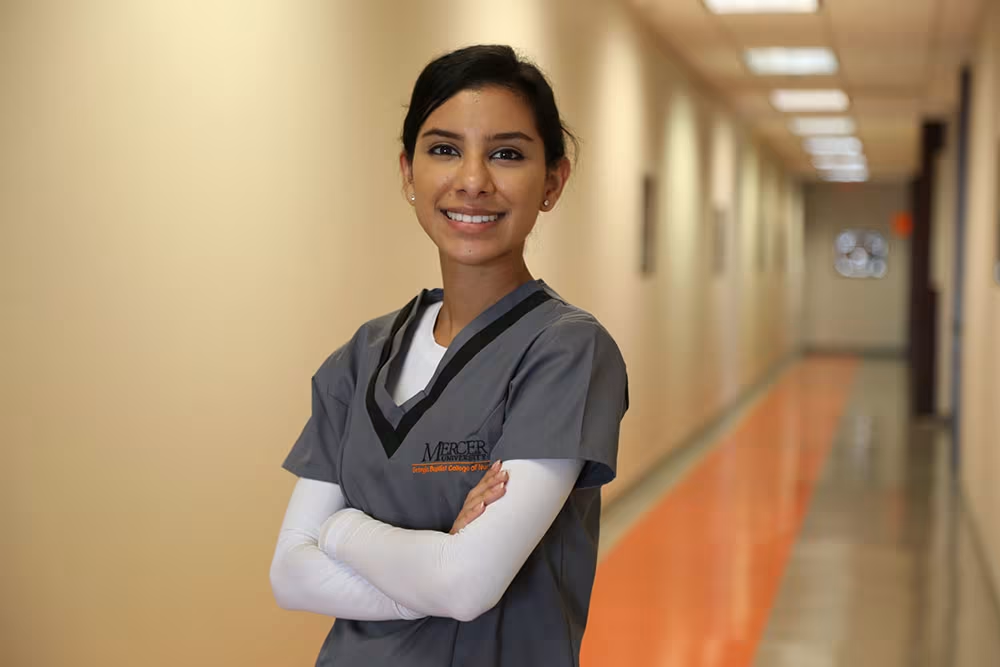How Nursing Simulation Labs Prepare Students for Real-World Patient Care
Each blog post is dated and contains accurate information as of that date. Certain information may have changed since the blog post publication date. If you would like to confirm the current accuracy of blog information, please visit our ABSN track overview page or contact admissions at 844.347.2108.
Nursing simulation labs are one of the most important elements of your nursing education. During these labs you will learn how to apply nursing skills and techniques within simulated care scenarios. With help from nursing simulation labs, you can prepare to become a practice-ready nurse.

Practicing nurses must be skilled and able to respond at a moment’s notice to care for patients. Nursing simulation labs involve working through patient care scenarios in a simulated clinical setting. Simulation labs help you build the patient care skills and techniques you will practice during clinical rotations and use throughout your career.
To support this essential component of nursing education, Mercer University’s Second Degree Accelerated Bachelor of Science in Nursing (ABSN) track integrates simulation and skills labs into the curriculum. The Accelerated BSN track has a blended, three-part curriculum that combines online coursework with immersive nursing labs and clinical rotations.
What is the simulation lab experience, and how do these labs work within Mercer’s ABSN track? In this blog we will explore what nursing labs are, what nursing students learn from labs, and how labs prepare students for real-world patient care.
What Is a Nursing Simulation Lab?
Nursing labs are the hands-on portion of a nursing curriculum. Nursing theory coursework often covers how nursing skills and techniques are performed, but nursing labs enable students to put these skills into practice. Located at our ABSN Learning Site in Atlanta, Georgia, Mercer ABSN nursing labs simulate a clinical environment with hospital-grade equipment.
Students in simulation labs work together under instructor supervision to address a patient care scenario. Simulation labs take place in controlled, simulated clinical settings, and they are key to preparing for clinical rotations, which see you delivering care to patients at top area healthcare facilities in Atlanta.

How the Simulation Lab Bridges the Gap Between Nursing Theory and Practice
In today’s healthcare environment, nurses manage more responsibilities than ever. Handling patient care scenarios, administering treatment, recording patient status, and coordinating the care team all commonly fall under their role.
Because of the demands of nursing, registered nurses who enter the profession with confidence and well-developed skills are positioned to thrive in a clinical environment from the first day of their career. Simulation labs play a key role in helping students build the practical skills and clinical knowledge needed to transition into real-world practice.

See how nursing simulation labs can prepare you for your nursing future.
What's Inside a Modern Nursing Lab?
Nursing simulation labs are an immersive learning experience. Students apply learned nursing skills and techniques to simulated patient care situations. These scenarios can be wide-ranging, requiring collaboration with fellow students and communication with instructors during each lab to succeed.
We will review what Mercer ABSN students can expect from their nursing lab experience.
Presentation and Briefing of Diverse Care Scenarios
The first element of any nursing simulation lab is the presentation and briefing of the scenario that students will face. Students will sit for a brief initial overview before beginning the simulation. Patient needs during simulated scenarios can change rapidly and impact the necessary treatment that students will apply.
For example, a scenario could begin with identifying an allergic reaction, then move on to treatment. Another could require diagnosing lung sounds to responding to a sudden cardiac arrest.

Applying Nursing Skills to Simulated Scenarios
These simulated scenarios are designed to push students to exhibit the best possible understanding of nursing skills and techniques. Situations can shift while requiring students to think on their feet, and students experience a simulated clinical setting that is as realistic as possible.
Students use the same equipment that they will encounter in clinical settings, and high-fidelity medical manikins can effectively mimic a variety of symptoms.
Post-Lab Debriefs
After nursing simulation labs, students participate in a debrief session with their instructors and fellow cohort members. During this time, students have an opportunity to examine their actions and identify what they did well, what went wrong, and what areas could be improved.
Debrief sessions can be crucial in correcting skills and stopping incorrect techniques before they are applied to real patients. This is where you can give and receive feedback, and you can learn and grow from your experience.

Why Nursing Simulation Labs are Essential in ABSN Programs
Nursing simulation labs are at the heart of an ABSN track curriculum. They give our instructors the chance to see how every student applies the concepts they have learned with online-based coursework. By learning and applying skills in simulation labs, you develop your critical thinking, your response time to changes in patient condition, and your confidence.
From building connections to staying organized, explore how you can thrive as a nursing student.

“We always have at least one simulation lab for our classes,” former Mercer ABSN student Kate Kirkland says. “They give us instruction on things that are good to practice with patients, interventions that we can initiate ourselves without a doctor, and things that we can do to go the extra mile for the patient to help them be more comfortable.”
That personal instructor interaction, and how students learn to care for the patient on a holistic level, is essential to the ABSN track experience.
Ready to Work Toward Your BSN Degree?
Nursing simulation labs are high-quality educational experiences that challenge and support students to become the best nurse possible. Mercer’s ABSN track develops practice-ready nurses equipped to deliver exceptional patient care, and labs are an important part of that.
If a career in nursing sounds like it might be right for you, speak with an enrollment counselor today. Take the first step toward becoming a nurse and making a difference in the lives of countless patients.
